Tasreen Khamisa:
I always had this drive to work with youth that didn’t have the same opportunities as others because I was that youth…went through
like a lot of bullying and a lot of biases and slurs about my race.
You know I spent my entire senior year in university studying cases like you know why do young people commit murder and it’s usually because they sit in a lot of pain in themselves. And I’ve always had so much/ empathy for kids that have gone through so much trauma and harm and then they get treated with so much punishment in life. Whether that’s you know in the criminal justice system or in our school system. They never get a chance to get healed.
This was the work I have always wanted to do. I just never thought I’d be doing it in my brother’s name.
My brother was working at a pizza place and he went to go deliver the last pizza of the night. And he was surrounded by a group of four
gang members and they had called in a pizza order to a bogus address. When he was heading back to his car they ambushed him and one bullet took my brother’s
life.
It was a 14-year-old boy that took Tariq’s life.
Dacher Keltner:
14-year-old Tony Hicks was the youngest person in California to be tried as an adult for murder, for the murder of Tariq Khamisa. In an extraordinary act of forgiveness and reconciliation, Tariq’s father, Azim Khamisa reached out to Tony’s grandfather and asked that they join together in spreading a message of peace in order to stop youth violence.
On every episode of our show, we have a happiness guinea pig try a research-based practice designed to boost happiness, resilience, kindness or connection. Then we talk about the science behind it.
Today we have Tasreen Khamisa, Tariq’s sister and Executive Director of the Tariq Khamisa Foundation. Tasreen, thank you for joining us today.
Tasreen Khamisa: Thank you for having me here.
Dacher Keltner: So I wanted to start with really the beginning of this incredible work that your family does, and it begins with hard stuff and really profound trauma.
Tasreen Khamisa: Yeah, it was the hardest thing in my life. It was very painful, and I think revisiting it, it’s still painful. I think losing someone that you love is always with you. It’s something you learn to live with.
Dacher Keltner: Changes you forever. Especially if it’s a brother or a child.
Tasreen Khamisa: Yes. Yeah, it changes you forever.
Dacher Keltner: A lot of studies of bereavement show it takes a couple of years when you lose a sibling or a child or a romantic partner, it takes a couple of years just to get back on your feet, to just to not feel the rage or anxiety or disconnect that happens from this. How did you start to pull out of it?
Tasreen Khamisa: I had to hit rock bottom first. I was in a really, really dark place and my father was actually very concerned about me. And he decided to just, you know, take me out of the country for about six weeks. And he started to help me process everything. And when I came back from that, I got myself into therapy. And I think I finally realized that I couldn’t do this alone. I needed help.
And so I started therapy, and I started running some of the youth programming at my mosque and…my passion has always been to work with kids. And when I started to do that at a voluntary level, it started to put, I think, slowly put meaning back in my life.
Dacher Keltner: Amazing.
Tasreen Khamisa: And then, my dad started a foundation just ten months after this happened. And he had reached out to Ples Felix, Tony’s grandfather and guardian, in forgiveness and said, “You know, we both lost sons that night. You know, I lost Tariq and he’s gone forever, and you’ve lost Tony. And why don’t you join me, and let’s prevent other families from suffering the way we have suffered, and let me help
you carry your burden, and you can help me carry mine.” And I just thought, “Wow.” I was so proud of my dad, but I wasn’t anywhere near that space in my own life yet.
And then I started working at the foundation and I thought, this is my path. I’m meant to be here.
Dacher Keltner: How did your dad forgive Tony Hicks? How do you think about that?
Tasreen Khamisa: It was really the night that he found out that it was a 14-year-old boy that took Tariq’s life. He really felt, and that’s where that, the whole phrase came out of his mouth was that they were victims of both
ends of the gun. Tony was a victim of society that we had all created and Tariq was a victim of Tony. And he very instantly took responsibility for the bullet that killed my brother.
I think with my dad, though, he has been a man of faith. He has been a man that has meditated since he was 18 years old.
Dacher Keltner: Yeah.
Tasreen Khamisa: He’s always taught me and Tariq ever since we were younger that you know we all have this place in ourselves. He calls it being “soul-ular”, S-O-U-L, that type of soulular, where we do have the
ability to tap into our essence. Tap into that place within us where we can do things bigger than ourselves.
Dacher Keltner: When I do a lot of teaching on forgiveness, one of the things that strikes me is when you get to these harder forms of forgiveness… just people whose parents have hurt one of their children, or abused a child,
or people who have been victimized by genocide. You get into these complicated circumstances where it’s hard to forgive. What was it like for you?
Tasreen Khamisa: It was hard. It was hard, and it was not instant. And I think for me, when I first heard that it was a 14-year-old that took Tariq’s life, I was really split down the middle. Part of me was really angry at Tony.
Really angry at the gang. But there was part of me that, you know I had spent my senior year studying cases like Tony. You know, why do young people commit murder?
And I started doing the work. I started to understand a little bit more about Tony. And you know, he was born to teenage parents. His parents were from rival gangs. He grew up experiencing violence for like 9 years of his life. You know, he saw his favorite cousin get stabbed to death. I mean, he had suffered a lot of trauma and harm in his life. And so, I think understanding him, I grew empathy for him. I started to let go of that anger in my heart, and the resentment. I was doing good deeds in the name of my brother, and that felt like I was honoring my brother.
Dacher Keltner: And then you, you’ve actually met Tony Hicks, and talked to him.
Tasreen Khamisa: Yeah, yeah. It took me a long time. I think
there’s different levels of forgiveness and I feel like I had peeled off a
layer, and I lived with that kind of piece of forgiveness for a long time. I
had no resentment towards him. I didn’t think bad thoughts about him. But I
didn’t have a relationship with him, at all. My father had the relationship
with him, you know. And I left the foundation for a good number of years and a
big part of me coming back, I knew in my heart that I needed to meet Tony
Hicks. I needed to sit down with him, and I needed to see him face to face.
Dacher Keltner: Yeah, look into his eyes.
Tasreen Khamisa: Yeah. I didn’t know what that meeting would be
like, and I went with Ples Felix, Tony’s grandfather, and I was nervous, I
couldn’t sleep the night before, and I just thought, how am I going to really
feel about this person, when I look him in the eye?
When I met him, I just felt so much
warmth. It was very instant. I don’t know if it was my brother’s energy that
just surrounded us, because that’s what I felt. My brother was very funny. Like
he always cracked me up. He was like the one person in life that I could really laugh with.
Dacher Keltner: As brothers do…
Tasreen Khamisa: Yes, yes and he always teased me, and we had that
relationship, and that is the relationship that I have with Tony Hicks. He makes me laugh, like tears roll out of my eyes, kind of laugh.
And it was amazing, you know? He’s become like my little brother. He calls me every Friday, every Sunday. We talk on the phone and he’s become a big part of my life.
Dacher Keltner: That’s amazing. Tasreen, I wanted to just get your sense of what you’re doing with the Tariq Khamisa Foundation and the amazing work you guys are doing in schools.
Tasreen Khamisa: Our mission is to create safer schools and communities. And all of the design of our programs have always been Tony in mind. And you know, what would have Tony
needed that night to not have pulled the trigger? And how can we support our kids and give them the tools they need to deal with their emotions in a healthy
way? And that even though their external world, we can’t change for them, we can help to build their resiliency, and we can help to build their forgiveness
muscle. And help them to kind of find that peace within themselves. Because that’s ultimately all they’re going to have sometimes.
Dacher Keltner: Incredible. We have this wonderful role of the guinea pig, and it’s really interesting in the context of people’s lives to think about why they choose a particular practice. And you chose this one about
contemplating feeling supported. And you know, when people ask me, like what’s the most important path to happiness? Or if my friend’s really depressed, what
should I do? And it always boils down to feeling supported and providing support.
There’s this work by this UCLA scientist, Naomi Eisenberger. She finds that when we just hear words of support, just like you providing them to Tony, and vice versa, those two times a week that you talk to each other, just hear those words of support, and your brain calms down, the safety networks in the brain are activated. It’s an amazingly powerful foundation of happiness. Why did you choose this practice?
Tasreen Khamisa: I chose this practice because I think it’s something I’ve struggled with a lot in my life of allowing myself to be supported.
I know that I’m good at doing that for other people. I love to just be that person for others. But I’ve always struggled with allowing people to be that for me.
Dacher Keltner: You know, a lot of the people that I teach, and this is just my own personal reflection who are in the world of service, like
you are, and really working with complicated social issues. It’s very easy for
them to give and to serve and to support. And then when you flip the equation,
right, or the direction of the arrow, and then it’s like now be supported or
receive something, it gets complicated. So interesting to hear you say that. So
tell us what you did. What were the steps that you walked through?
Tasreen Khamisa: Well, first I made a list of the people that I felt I was close to, or who like offer comfort or security in my life. And
tried to brainstorm like who those people were and realized that the list of people that I came up with, I mean, I do have a list, which is great! You know?
I mean, I’ve got people!
Dacher Keltner: Was there more than one person?
Tasreen Khamisa: And it’s interesting…Different people have supported me I think, in different ways. Some of the questions
were, who is the person you most like to spend time with? Who is the person
that’s hardest to be away from? Who do you talk to when you’re worried and when
you’re feeling down and who will always be there for you? That’s kind of how I
started with that piece of the practice.
Dacher Keltner: And the next step asks you to look at the qualities these people have in common and why you think you listed them?
Tasreen: Yeah, just looking at the qualities of those people. I think the theme that came through that is that there are people
in my life that really accept me. That don’t judge me. And acknowledge me. And I
think that those were just important parts to me feeling really supported.
Dacher Keltner: That’s kind of the foundation of support is just this non-judgmental appreciation. So well-put. So then
the practice asks you to to recall a situation when you were
feeling distressed or worried and how one of these people comforted and helped you and to write about it.
Tasreen Khamisa:
What came to mind when I started doing this, and I was journaling about
it. I think the two strong times in my life, different people have supported me with the
loss of my brother, of course, and then I just recently, you know, // had a
loss of my marriage. And I think that, in both those times, it was the human connection of having a
healthy supportive person in my life that pulled me out of that.
The first person that came to mind, and I just, I haven’t been in
therapy for about a year but my therapist came up really quickly in all of
this. Because I think that obviously he was the one person that I checked all
those boxes with, you know? A lot of my work with him and my healing with him
really helped me to be able to take risks and take chances.
And then I have a best friend who
has been with me through a lot and so of course her face popped in my brain. A
friend that is always there no matter what. Even if I’m having a really bad
hair day or whatever. I don’t want to stop watching Bollywood in my pajamas for
like days at a time, and just that one person that’s just always there for you.
Dacher Keltner: You know one of the really striking things about
these practices is they can kind of trigger these other benefits. You might
feel more grateful or you walk outside and the wind blowing through the trees
seems a little more beautiful. They have these more enduring effects. What kind
of impact did doing this feeling supported practice have on you? Did it last
for a while or..
Tasreen Khamisa: It did. I feel, just more at peace, I guess. My anxiety levels lessen. I realize that, there’s
people around. That I’m not existing alone. And when things are tough I don’t
have to stay stuck in that. You know, sometimes sharing, or opening up your
life to other people can be the most meaningful thing that you can do. And I
think for me that’s a big lesson for me, because I tend to, when I’m going
through something really difficult, I tend to close. And it’s very automatic
for me. That’s like my natural place to go is to shut down. And when I do that,
I’m not happy. And so when I can let someone in, I always feel more joyful. Happier. Lighter.
Dacher Keltner: In the scientific literature, that’s how we think
about support is it activates these empathy regions of your brain, and oxytocin
release which is this little chemical that kind of opens your mind to the
kindness of others. I think opening, being curious like you say, is as important as it gets.
Well, you know Tasreen I wanted to say, you know one of the trickier parts of the Science of Happiness, and my
undergraduates whom I teach always sort of take a step back as I say, Look, you know, first noble truth of Buddhism
and a lot of the great contemplative traditions is, we’re going to suffer, and we lose people. And we know in the Science of Happiness that a lot
of growth and wisdom and kindness and good work comes out of that. And your story is one of the richest stories on that theme I’ve heard. So I want to thank you for sharing.
Tasreen Khamisa: No, thank you.
Dacher Keltner:
One of the things that we’ve learned in the science of happiness is that social support is one of the strongest determinants of happiness. Studies find that if you really feel supported by others and you feel that they have your back, you gain 10 years of life expectancy.
One of the best studies in this literature is by Mario Mikulincer and colleagues. Here’s what they did. They
brought people to the lab and they assigned them to think of somebody that they
really feel supported by and write about that person. And then in the experiment the participant encounters somebody who’s in distress. They have to
watch really horrifying films or in one study they actually have to hold a tarantula
and they’re spider phobic. And what Mikulincer and colleagues find is if I simply think of somebody who supports me, right. A Parents
a friend or romantic partner I feel more compassion for the person in distress and I actually volunteer more time to help that individual even to the extent
that I’ll volunteer to help hold the tarantula to let this suffering other participant not have that trouble.
So really powerful evidence at the experimental level showing just thinking about people who support us actually has these happiness benefits.
If you would like to try the Feeling Supported Practice or practices like it, go to GGIA dot Berkeley dot EDU.
Thank you for your emails, calls, and letters. We think your stories will inspire others and we’ll be sharing some of them on the show. So call us at (510) 519-4903 and let us know how doing the Feeling Supported practice went for you!

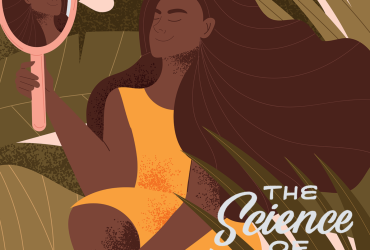
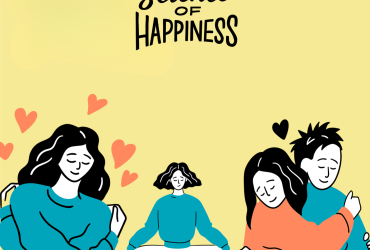
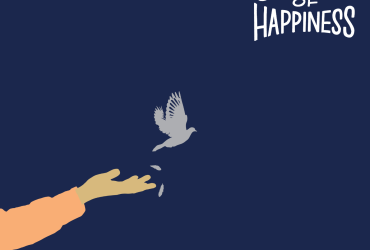

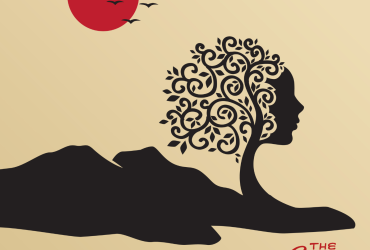
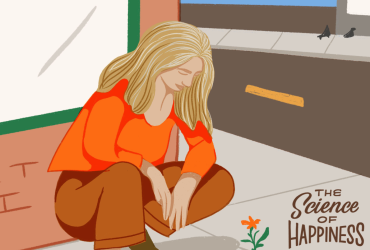
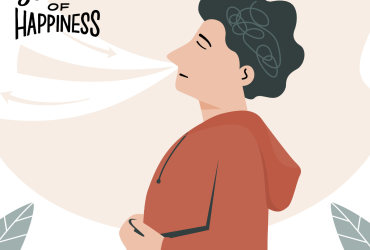
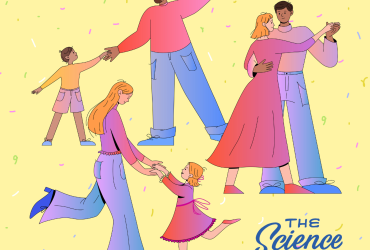
Comments